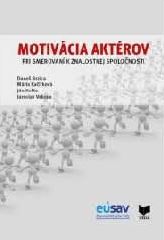Publications - Monographs and Scientific Edited Books
Motivation of Actors in Transition Towards Knowledge-based Society
Kolektív autorov
Team
Ing. Jaroslav Vokoun, Ing. Ján Košta, CSc., Ing. Mária Kačírková, Ing. Daneš Brzica, PhD.
- Year: 2014
- Pages: 282
- ISBN 978-80-7144-238-7
Research, development, innovation and education in the Slovak Republic have a long history. There are numerous companies, organizations, research and education with a lot of workers. In the research, development, innovation and education it operates a range of institutions that manage them and support them. Despite this high institutional density, the Slovak Republic finds itself in international comparisons between countries that have inadequate results in these areas. Importance of these problems is evidenced by teachers´ strike, protest of assembly of researchers and dismissal of the Minister of Education.
The monograph focuses on the economy segment, which is formed by a group of creative workers and entrepreneurs who promote changes in society through innovative and knowledge-based processes. In the most important areas of so called knowledge triangle - education, research, and innovation - we draw attention to the internal and external motivating factors that encourage actors to make improvements and changes towards a knowledge-based society.
In stimulating the actors of knowledge society it is essential the economic maturity of the economy of a particular country. Pillars of development are: human capital, business dynamism, innovation and new technologies. Knowledge society we perceive as "permanently learning society" in which lifelong learning is a vital necessity. Among the individual life strategies of Slovak citizens is relatively weakly represented strategy to invest in own personal development. The holders of active strategies are the young and educated, economically active people. The least are in the Slovak population represented life strategies related to the creation, invention process and entrepreneurship.
In the knowledge society is an important motivating factor stimulating innovative activity and knowledge transfer - besides competition - cooperation among the various groups of actors. In our book we examine the relationships between key actors of triple helix, identify key drivers of the transition to a knowledge-based society and present labor market analysis with an emphasis on understanding labor market segmentation in terms of those groups of workers who have the potential for employment in the knowledge economy.
We analyze processes in research, innovation and education system, and based on the assessment of substantial weaknesses we identify the main barriers to development. We examine the external socio-economic, institutional and economic-policy incentives in motivation, which influence most orientation towards a knowledge economy. Analysis of the development of the knowledge economy provides also a comparison with EU countries. We have used information from three VEGA projects, in which we examined the dynamics of technological change, the development of network structures and cooperation and motivation of the knowledge society participants.
Specifically we are considering the motivation as a factor of change that is required to reduce lagging and increase dynamism of the Slovak economy in the criteria, which define the knowledge society. Focusing on stimulating and activating we bring a new view of the main problems and propose solutions. The area of research is essential parts of the knowledge society and their mutual connection - education with linkages to the labor market, the intensification of research, transfer of knowledge and innovation as a key element of competitiveness. In addressing the issue, we have used both empirical findings from our own survey among research and development staff and surveys of other institutions.
The publication is structured on two major groups of issues: actors and processes related to the development of the knowledge society. It is divided into six sections. After an introduction, in the first chapter are listed the methodological starting points and research presented in a diverse range of research studies. The second chapter contains contextual conditions of motivation of the actors, based on the changing nature of society. In the third chapter are characterized main groups of actors - research and development organizations (SAS, universities and other actors), research and development staff, educational organizations, companies, government institutions, government and non-profit organizations. In the fourth chapter we identify key processes and factors affecting the motivation of actors in the knowledge society. We focus on issues related to the cooperation, lifelong learning, creativity, networking, clusters, innovation and social cohesion. In the fifth chapter we bring variety of aspects related to the labor market in the area of skilled labor with innovation potential.
The publication ends by summarizing the main findings, attachments and literature. The Annex contains tables giving a detailed overview of the results of our own survey among R&D staff.
Menu
- All
- Monographs and Scientific Edited Books
- Conference Proceedings
- Research Papers IER SAS online
- Expert Papers IER SAS online
- Working Papers IER SAS online
- Policy Brief IER SAS online
- Others online
Contact
Sancova 56
Bratislava 811 05
Tel.: +421-2-5249 8214
eusav.director@savba.sk Slovenská akadémia vied Stratégia ľudských zdrojov pre výskumníkov (HRS4R)


